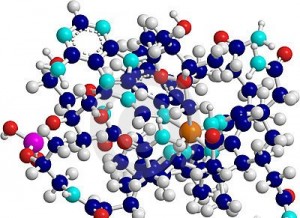You might be surprised to know that vitamin B12 deficiency can cause symptoms like depression, fatigue, and anxiety. Vitamin B12 benefits your body in many ways, and when you don’t get enough, you can start to feel sluggish, nervous, and depressed, in addition to suffering many neurological disorders. Sometimes, depression from B12 deficiency mimics clinical depression, interfering with a proper diagnosis.
Do you have vitamin B12 deficiency?
The only way to be certain if your B12 levels are low is by getting a blood test. This will indicate if you need more vitamin B12, even if it doesn’t necessarily explain why your B12 levels are lower than normal.
Here are some typical signs of vitamin B12 deficiency that “masquerade” as mental illness:
- Chronic fatigue
- Anxiety
- Depression that lingers
- Sleep difficulties
- Paranoia
- Aggressiveness
- Hallucinations
Neurological symptoms of B12 deficiency include:
- Painful tingling in your legs, hands, and feet
- Frequent clumsiness and tripping
- Altered sense of taste
- Sore tongue
- Vision problems
How many types of depression are there?
Here are some of the most common types of depression:
 Major depressive disorder: The National Institute of Mental Health (NIMH) characterizes major depression as a “combination of symptoms that interfere with a person’s ability to work, sleep, study, eat, and enjoy once-pleasurable activities.” Most people who suffer from major depression will experience several episodes of depression in their lives, but it is possible to experience it only once. With major depressive disorder, medication is required for treatment of symptoms.
Major depressive disorder: The National Institute of Mental Health (NIMH) characterizes major depression as a “combination of symptoms that interfere with a person’s ability to work, sleep, study, eat, and enjoy once-pleasurable activities.” Most people who suffer from major depression will experience several episodes of depression in their lives, but it is possible to experience it only once. With major depressive disorder, medication is required for treatment of symptoms.
Dysthymic disorder: Dysthymia is depression that lingers over several years. With dysthymia, depression is less severe than major depression, and not as likely to interfere in one’s ability to work or study. Still, dysthymic disorder causes feelings of sadness and disquiet. People with dysthymia may suffer from episodes of major depression, as well.
Minor depression: Minor depression is diagnosed when one has a short interval of depression over a few weeks. Minor depression itself is not debilitating, but untreated may escalate into major depression.
Bipolar disorder: Manic-depressive illness is less common than major depression, and involves swift mood changes that alternate from exhilarating highs to deep depression.
Psychotic depression: Depression that accompanies other forms of severe mental illness, such as hallucinations or delusions, is called psychotic depression.
Postpartum depression: About 10%-15% of women suffer from postpartum depression after giving birth, which is caused by shifting hormones and overwhelming lifestyle changes.
Seasonal affective disorder (SAD): During the winter months, it is common for some people to suffer from seasonal affective disorder because of decreased exposure to sunlight. Still, antidepressants and psychotherapy are more effective at treating SAD than light therapy.
Depression from vitamin deficiency: Vitamin B12 deficiency and folate deficiency are directly linked to some incidences of depression. According to NIMH, “depression and poor response to antidepressant medication have been linked to deficiency in the vitamins folate and B12.”
In other studies, elevated homocysteine levels were associated with increased risk for depression. Vitamin B12 and folate supplementation, which decrease homocysteine levels in the blood, were instrumental in treating depression.
Can Elevated Homocysteine (Low B12) cause Mental Illness?
What’s the connection between vitamin B12 and depression?
Vitamin B12 (cobalamin) is necessary for various biochemical functions, such as DNA synthesis, red blood cell distribution, production of myelin, which protects your nerve cells, and breaking down homocysteine. In addition, vitamin B12 also helps to maintain healthy cognitive functioning.
When vitamin B12 levels are low, your brain suffers. You begin to experience severe memory loss, fatigue, difficulty concentrating, and emotional problems like depression, anxiety, paranoia, feelings of hostility, and moodiness.
What is vitamin B12, and why is it so important?
Where can I get more vitamin B12?
Vitamin B12 food sources include meat, fish, milk, and egg products. However, if you suffer from pernicious anemia or other autoimmune disorders, you probably cannot digest vitamin B12 from foods, and must supplement with sublingual vitamin B12 or vitamin B12 shots.
Please tell us…
If you suffer from depression, have you had your B12 levels checked, as well? If you currently take vitamin B12 supplements, do you take them orally, through B12 injections, or otherwise?
Let us know how we’re doing…
Please comment below, and share our page with your friends!
Read more about vitamin B12 deficiency and depression:
Eating Your Way Out of Depression with B-12
Tired of being Tired all the Time…It’s Tiring!
Vitamin Deficiencies can drive you Crazy- Seriously! Part 1
Sources:
Effectiveness of Vitamin Supplementation in Treating People With Residual Symptoms of Schizophrenia
Treatment of depression: time to consider folic acid and vitamin B12- PubMed, NCBI



